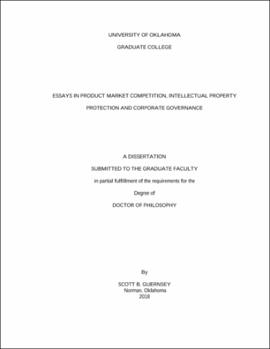| dc.description.abstract | This dissertation is a collection of three essays that investigate the value implications of product market competition, the impact of trade secrets protection on capital structure decision-making, and the long-term value relevancy of the right to adopt a poison pill.
Chapter 1 explores the value impact of product market competition (PMC) on long-term firm value. Using exogenous state adoption of anti-plug-mold statutes, and their subsequent invalidation, I causally show that decreased PMC generates economically and statistically significant long-term firm value, especially for firms with greater innovative ability. My findings are robust to different specifications, including matching and portfolio analysis, and provide support for the view that a reduction in PMC leads to higher firm value by increasing investments in new and existing production technologies.
Chapter 2 isolates the causal effect of an increase in trade secrets protection on financial leverage by examining the staggered implementation of state-level trade secrets laws – the Uniform Trade Secrets Act. First, we show the adoption of these statutes is plausibly exogenous to corporate debt policies. Next, we document that large firms located in states that have passed these laws increase their debt ratios relative to firms in states without such legislation. We also find that better protected large firms experience a reduction in operating leverage, probability of default, and cash flow volatility. Further, our evidence suggests that companies with higher likelihoods of default adjust their debt levels upward after their headquartering state adopts a statute. Overall, the results are consistent with stronger trade secrets protection leading to increases in financial leverage via decreasing bankruptcy costs. Lastly, we show large firms benefit from this trade-off and experience positive long-term value effects.
Chapter 3 analyzes the value impact of the right to adopt a poison pill – or “shadow pill” – on long-term firm value, exploiting the natural experiment provided by the staggered adoption of poison pill laws that validated the use of the pill in 35 U.S. states over the period 1986 to 2009. We document that the availability of a shadow pill results in an economically and statistically significant increase in firm value, especially for firms more engaged in innovation or with stronger stakeholder relationships. Our findings are robust to different specifications, including matching and portfolio analysis, and provide support to the bonding hypothesis of takeover defenses. | en_US |
